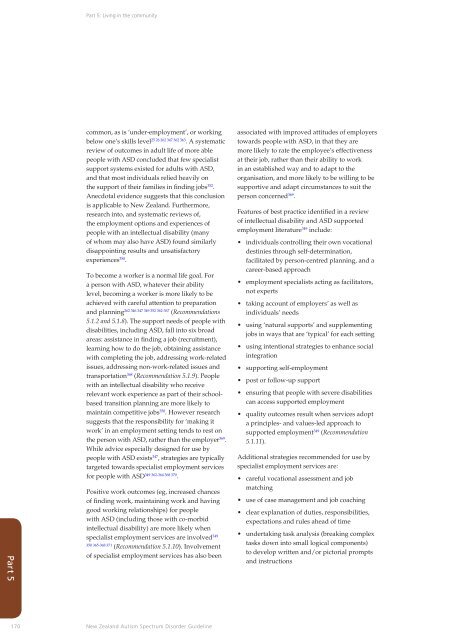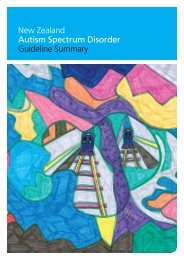New Zealand Autism Spectrum Disorder Guideline - Ministry of Health
New Zealand Autism Spectrum Disorder Guideline - Ministry of Health
New Zealand Autism Spectrum Disorder Guideline - Ministry of Health
You also want an ePaper? Increase the reach of your titles
YUMPU automatically turns print PDFs into web optimized ePapers that Google loves.
Part 5: Living in the community<br />
Part 5<br />
common, as is ‘under-employment’, or working<br />
below one’s skills level 25 26 262 347 362 363 . A systematic<br />
review <strong>of</strong> outcomes in adult life <strong>of</strong> more able<br />
people with ASD concluded that few specialist<br />
support systems existed for adults with ASD,<br />
and that most individuals relied heavily on<br />
the support <strong>of</strong> their families in finding jobs 352 .<br />
Anecdotal evidence suggests that this conclusion<br />
is applicable to <strong>New</strong> <strong>Zealand</strong>. Furthermore,<br />
research into, and systematic reviews <strong>of</strong>,<br />
the employment options and experiences <strong>of</strong><br />
people with an intellectual disability (many<br />
<strong>of</strong> whom may also have ASD) found similarly<br />
disappointing results and unsatisfactory<br />
experiences 350 .<br />
To become a worker is a normal life goal. For<br />
a person with ASD, whatever their ability<br />
level, becoming a worker is more likely to be<br />
achieved with careful attention to preparation<br />
and planning 262 346 347 349 352 362-367 (Recommendations<br />
5.1.2 and 5.1.8). The support needs <strong>of</strong> people with<br />
disabilities, including ASD, fall into six broad<br />
areas: assistance in finding a job (recruitment),<br />
learning how to do the job, obtaining assistance<br />
with completing the job, addressing work-related<br />
issues, addressing non-work-related issues and<br />
transportation 368 (Recommendation 5.1.9). People<br />
with an intellectual disability who receive<br />
relevant work experience as part <strong>of</strong> their schoolbased<br />
transition planning are more likely to<br />
maintain competitive jobs 350 . However research<br />
suggests that the responsibility for ‘making it<br />
work’ in an employment setting tends to rest on<br />
the person with ASD, rather than the employer 369 .<br />
While advice especially designed for use by<br />
people with ASD exists 347 , strategies are typically<br />
targeted towards specialist employment services<br />
for people with ASD 349 362-364 368 370 .<br />
Positive work outcomes (eg, increased chances<br />
<strong>of</strong> finding work, maintaining work and having<br />
good working relationships) for people<br />
with ASD (including those with co-morbid<br />
intellectual disability) are more likely when<br />
specialist employment services are involved 349<br />
350 365-368 371<br />
(Recommendation 5.1.10). Involvement<br />
<strong>of</strong> specialist employment services has also been<br />
associated with improved attitudes <strong>of</strong> employers<br />
towards people with ASD, in that they are<br />
more likely to rate the employee’s effectiveness<br />
at their job, rather than their ability to work<br />
in an established way and to adapt to the<br />
organisation, and more likely to be willing to be<br />
supportive and adapt circumstances to suit the<br />
person concerned 369 .<br />
Features <strong>of</strong> best practice identified in a review<br />
<strong>of</strong> intellectual disability and ASD supported<br />
employment literature 349 include:<br />
• individuals controlling their own vocational<br />
destinies through self-determination,<br />
facilitated by person-centred planning, and a<br />
career-based approach<br />
• employment specialists acting as facilitators,<br />
not experts<br />
• taking account <strong>of</strong> employers’ as well as<br />
individuals’ needs<br />
• using ‘natural supports’ and supplementing<br />
jobs in ways that are ‘typical’ for each setting<br />
• using intentional strategies to enhance social<br />
integration<br />
• supporting self-employment<br />
• post or follow-up support<br />
• ensuring that people with severe disabilities<br />
can access supported employment<br />
• quality outcomes result when services adopt<br />
a principles- and values-led approach to<br />
supported employment 349 (Recommendation<br />
5.1.11).<br />
Additional strategies recommended for use by<br />
specialist employment services are:<br />
• careful vocational assessment and job<br />
matching<br />
• use <strong>of</strong> case management and job coaching<br />
• clear explanation <strong>of</strong> duties, responsibilities,<br />
expectations and rules ahead <strong>of</strong> time<br />
• undertaking task analysis (breaking complex<br />
tasks down into small logical components)<br />
to develop written and/or pictorial prompts<br />
and instructions<br />
170<br />
<strong>New</strong> <strong>Zealand</strong> <strong>Autism</strong> <strong>Spectrum</strong> <strong>Disorder</strong> <strong>Guideline</strong>











